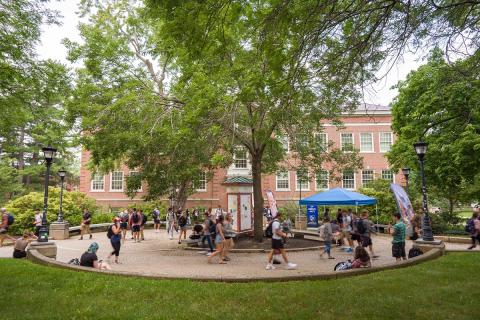How to Pick Your Major

Let’s talk about majors here at UNH. Whether you’re picking your major for your application, coming in as an undeclared student or changing your major, you’ll find that UNH offers an incredible range of majors and top-ranked programs – and lots of supportive resources and advising to help you navigate all your opportunities.
UNH’s approach to majors was really important to me when I was looking at schools. Coming out of high school as a serious dancer, I went through ballet auditions at several colleges, mostly in B.F.A. programs. I was struggling to find a school that offered the rigor in dance and performance that I was looking for, but that still gave dancers the space to study other things. It was incredibly important to me to have a broader academic experience so I could go on after UNH and pursue a higher degree that may not be related to dance. This is where UNH’s theatre and dance department came in. I was so happy to find my small community within UNH’s dance department, where there are more double majors than single majors! I found great support in balancing both majors through my own sort of advising team in the communication, dance and honors program. Each advisor listened to my concerns and worked with me to create a plan that checks all my boxes. The result is a dance program that is equally as challenging as some other schools I toured – and I am still able to double major in communication and participate in the honors program.
UNH Has So Many Majors
With over 100 undergraduate degree programs, you really can’t go wrong here in wildcat country. Around 30% of students change their major at least once, and about 28% of first year students come into UNH with an undeclared major. The great thing is that there are so many options to find your path! Plus, new majors, minors and cognates are being added all the time to respond to student interest and the world outside our door.
Colleges and Schools
There are five undergraduate colleges at UNH’s flagship Durham campus: the College of Liberal Arts (COLA); the College of Life Sciences and Agriculture (COLSA); the College of Engineering and Physical Sciences (CEPS), the College of Health and Human Services (CHHS); and the Peter T. Paul College of Business and Economics (Paul). The Thompson School of Applied Science is another valuable option, offering two-year programs in veterinary tech, applied animal science and forest technology. I encourage you to learn more about each college by visiting their websites, following them on social media or attending prospective student information sessions. Once you settle into which college fits best, go through and check out their individual degree programs to narrow your search.
Where do I start?
There are great resources on campus to help you choose a major. Definitely reach out to your advisor for guidance. I was assigned an advisor from the theatre and dance department at my orientation. In this conversation, I expressed my intention to add communication as a double major. Then, I was actually able to just walk down the hall and introduce myself to the person who would become my communication advisor, which helped me get a jumpstart on some of the required classes.
While my situation is a little bit unique, the main takeaway is to never be afraid to ask for help. The advisors here are happy to guide you in the right direction toward anything you’d like to accomplish. They can recommend classes for you to fulfill your major requirements, talk about you career plans, and help you add minors or designations when applicable. I met one of my favorite professors at UNH because my advisor recommended I take her class. The more you develop a relationship with your advisors, the better their recommendations will be.
- If you’re not sure how to find you advisor, check out MyWildcatSuccess which you can login to from WebCat. Go to “Schedule an Appointment” on the right-hand side and then choose “Major Specific Advising” and “(your college)-Meet with My Advisor.”
- The availability that pops up will be for the person whom you want to talk to, and they’ll be happy to help!
Another awesome resource is the course COLA 401, an advising seminar to help undeclared students choose a major. You can also come into a specific college undeclared – like if you know you want to help people in the health sector but aren’t yet sure about the best CHHS major for you. It’s also important to reflect on your own interests and ideas. Did you take a class in high school that you’d like to pursue further? Maybe you had an internship or job that inspired you. And remember – all opportunities that help you learn about yourself are valuable. My high school internship as a first-grade teacher's assistant taught me that I didn’t want to go into teaching. Sometimes that is just as important. UNH’s Career and Professional Success office can also help you explore career pathways that reflect your interests.
Competitive Majors
UNH also considers certain programs “competitive majors,” which means they may be capped at a certain limited capacity or require specific coursework before admission; it’s important to keep this in mind when making your decision since applying early action will give you priority consideration for these majors. Competitive majors include health sciences, kinesiology, occupational therapy, and nursing, as well as some majors in Paul College. You can read more about competitive majors and see if they’re right for you here.
Finally, don’t stress! At UNH, you’ll be supported on every step of your academic journey.